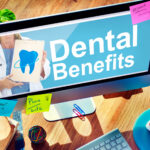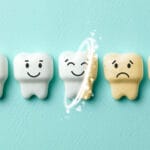Factors in Cavity Prevention
A “clean bill of health” after visiting the dentist makes most people very happy. It validates all those hours spent brushing and flossing! But how do you feel when the dentist finds a cavity? If you have a regular oral hygiene routine and tend towards a low-sugar diet, you may be confused by the appearance of dental caries. Therefore, let’s consider the typical causes of cavities.
Tooth decay is actually one of the most common health issues around the world and affects individuals of all ages. The CDC reports that 57% of adolescents aged 12 to 19 and 90% of adults aged 20 and older have had at least one cavity. Did you know that at certain times in life you are more at risk of developing cavities? Understanding when and why can help you to proactively avoid them. Here are some of the factors to consider:
How Old Are You?
The first factor in cavity development is age. Children are more likely to get cavities, mainly because they are seldom regular or thorough in their dental hygiene. Older adults are also more susceptible to tooth decay, usually because of age-related gum recession. Recession exposes more of the tooth enamel and the reveals the dentin that forms the roots. Plaque and tartar buildup on these surfaces then leads to further exposure to oral bacteria, the main cause of cavities.
What Do You Eat?
Your diet is also a factor to consider. High sugar and simple carbohydrate intake leads to increased energy for oral bacteria. The greater the amount of bacteria, the greater the amount of acid in the mouth and on the teeth. This acid wears down the outer enamel, leading to cavity formation. Constant nibbling or grazing on snacks during the day also puts you at risk for increased cavities. This is because food remains on your teeth throughout the day and your saliva just can’t keep up with rinsing your teeth clean. If the bacteria can feast constantly throughout the day, the amount of acid they produce is likewise constant.
Another factor based on diet is the acidity of the foods you eat. Sour candies, sodas, citric juices, and other high acid foods, even if natural or whole foods, can damage the teeth if consumed in large quantities or in small quantities over a long period of time. It is very important to combine sour or high acid foods with a regular intake of plain water. This helps the saliva to rinse the excess acid from the food off of the tooth enamel. One of the worst things you can do to your teeth is to eat or drink highly acidic foods and then to immediately brush your teeth. Instead of cleaning off the acid, immediate brushing ends up etching the enamel with the free acids in the mouth. Instead, rinse the mouth with water before brushing or wait thirty minutes before brushing for saliva to do the job.
Struggling to Keep Good Habits?
Oral hygiene habits are also very important. This is no surprise. Inadequate brushing and flossing eventually leads to cavities. Perhaps your dental hygiene routine has changed. After a long day at work, picking up the kids from school, making dinner, cleaning up, and preparing for the next day, you may be so tired that you go to bed without brushing and flossing your teeth. If this becomes a constant habit, you increase your risk of cavities.
Another good habit that many of our patients fail to maintain is visiting the dentist at least twice a year. These regular maintenance visits clean off the bacterial colonies living in plaque and tartar, minimizing the effect of oral bacteria on the tooth enamel. Oral cleanings also reduce the amount of gum recession, limiting the exposure of tooth enamel and dentin to oral bacteria.
Wish You Had More Saliva?
Another condition that makes you more susceptible to cavities is dry mouth, or xerostomia. Saliva not only helps us chew and digest food, but also kills germs and neutralizes the acid produced in our mouth to protect us from tooth decay. Some people genetically produce less saliva than others. For others, dry mouth is a symptom caused by the use of alcohol, tobacco, or certain medications, both prescription and over-the-counter. Some antacids, painkillers, and high blood pressure medications are known to lead to dry mouth. If you suffer from dry mouth, discuss it with our dentist to come up with solutions. You may need to visit the dentist more often for oral cleanings, or we can provide other solutions to limit the negative effects of dry mouth.
Don’t be So Hard on Your Teeth!
Some of us are harder on our teeth than others. Do you clench your teeth when stressed? How about grinding your teeth at night? Or perhaps you bite your nails or chew on ice or other hard objects. Maybe you are unconsciously an aggressive tooth brusher. All of these actions wear down our teeth, leaving them susceptible to cavities. Breaking these habits helps prevent damage to the enamel and sometimes allows the teeth to restore themselves over time.
Prevent Cavities with the Yuba City Dentistry Group
If one or more of these areas of concern apply to you, you can make the necessary changes to protect your teeth! The dental team at the Yuba City Dentistry Group wants to provide you with the tips and encouragement needed to reduce your risk of tooth decay and improve your oral health. Contact us today for a consultation!




0 Comments